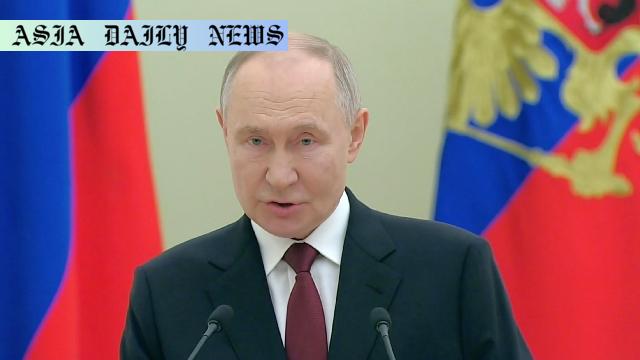Nuclear Weapons: Putin states no need for nuclear weapons in Ukraine, emphasizing Russia’s strength and long-term strategy.
Putin assures the need for nuclear weapons in Ukraine has not arisen.
Russia aims for a ceasefire favorable to its interests.
Putin reflects on succession and leadership in Russia.

Putin’s Assurances on Nuclear Weapons in Ukraine
Russian President Vladimir Putin, in a recent televised interview, assured that the use of nuclear weapons in the Ukrainian conflict has not become necessary. While the topic frequently generates speculation due to Russia’s nuclear arsenal, Putin’s comment suggests an effort to manage global tensions surrounding war and nuclear diplomacy. Furthermore, he expressed hope that such an extreme course of action would not be required, indicating a measured approach to the ongoing conflict. These remarks resonate amid heightened international concern about warfare escalation in the region.
Strategic Vision and Ceasefire Goals
Putin emphasized Russia’s strength and its determination to bring the conflict in Ukraine to a “logical conclusion” that aligns with its interests. This appears to hint at a strategic ambition aimed at negotiating a ceasefire favorable to Moscow’s terms. Analysts suggest this reflects a long-term view of the geopolitical chess game being played in the region. Despite international pressures, Putin’s comments highlight the resolve to pursue outcomes that provide strategic advantage to Russia.
On Leadership and Succession in Russia
The topic of succession was another focus of Putin’s interview. As with many long-term leaders, the question of who will follow him remains pertinent. Putin underlined the significance of a leader who gains and retains public trust while suggesting such choices lie in the hands of the Russian people. While no specific names were mentioned, this acknowledgement of succession planning sheds light on the dynamics of leadership continuity in Russia’s political system.
Broader Implications of Putin’s Statements
Putin’s latest remarks carry significant implications for international observers, governments, and organizations tracking the Ukraine conflict. His assurances about refraining from nuclear deployment can be seen as a stabilizing statement during turbulent times. However, his vision for a “logical conclusion” that serves Russian interests continues to stir debate on what this means for Ukraine and the West. As Russia recalibrates its military strategies and explores diplomatic solutions, Putin’s words underscore the importance of observing his country’s policies closely.
Conclusion
Overall, Putin’s interview offers a glimpse into Moscow’s current mindset—balancing rhetoric with calculated positioning on the international stage. As the situation evolves, the world will remain attuned to Russia’s intentions and actions, especially as they pertain to nuclear diplomacy and conflict resolution strategies.
Commentary
Understanding Putin’s Perspective on Nuclear Strategy
President Vladimir Putin’s recent statements on the nuclear dimension of the Ukraine conflict have sparked interest among global policymakers and analysts. By categorically stating that the need for nuclear arms has not arisen, Putin is perhaps aiming to ease fears of unnecessary escalation in an already volatile situation. This acknowledgment is refreshing, albeit rooted in strategic positioning, as it aligns with Moscow’s broader aim to maintain its relevance in global geopolitics. A nuclear conflict in Europe would have catastrophic consequences, and Putin’s assurance grants some measure of relief, even if skepticism lingers.
Russia’s Vision of Conflict Resolution
Equally intriguing are Putin’s remarks about bringing the conflict in Ukraine to a “logical conclusion.” What exactly does this imply for both Russia and Ukraine? On one hand, it hints at the Kremlin’s readiness to pursue a resolution to the conflict. On the other hand, attaching the phrase “on Russia’s terms” casts doubt on the feasibility of this endeavor. Achieving a ceasefire that benefits Moscow might extend the conflict or complicate global mediation efforts. Yet, it also underscores Russia’s perspective of geopolitical realism—an outlook that prioritizes its sphere of influence.
Impact of Leadership and Succession
Putin’s admission of contemplating his successor adds another layer of curiosity. In a nation with a complex political history, the process of transitioning power remains a topic of great significance. While Putin refrains from naming potential successors, his emphasis on public trust suggests the Kremlin may seek to cultivate continuity in leadership. This is crucial for stability, both internally and in the global arena. As the world observes, how Moscow navigates this sensitive topic will define the next chapter of Russian politics and its role on the global stage.
Global Implications
In conclusion, Putin’s statements are reflective of a leader who remains conscious of both internal and external perceptions. His careful balance between nuclear diplomacy, conflict resolution, and leadership planning showcases a multi-layered effort to manage Russia’s image. While his words are subject to interpretation, they provide a window into the evolving geopolitical narrative shaped by the Kremlin. Whether these statements translate into tangible actions remains to be seen, but they certainly have an enduring impact on the discourse surrounding this ongoing crisis.


